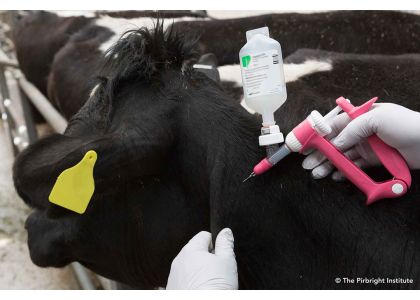
A commercial licence for a vaccine to protect livestock, including cattle, against several serotypes of the foot-and-mouth disease virus has been granted to MSD Animal Health by the Pirbright Institute and its research partners.
The new vaccine is more stable than current foot-and-mouth disease vaccines and is less reliant on cold-chain distribution – characteristics that give the vaccine greater potential for helping to relieve the burden placed on regions where the disease is endemic in large parts of Africa, the Middle East and Asia, reports The Pribright Institute.
The vaccine has been developed over the years from basic science to animal trials as a result of collaborations between Pirbright, the University of Oxford, Diamond Light Source, the University of Reading, and MSD Animal Health, a division of Merck & Co., which will now be taking forward the new technology into development, registration and manufacturing.
This vaccine is made of small synthetic protein shells, called ‘virus-like particles’, which mimic the virus’ outer shell and are designed to trigger optimum immune responses. Unlike other inactivated foot-and-mouth vaccines, these virus-like particles do not require high containment facilities for production and have been engineered to remain stable up to temperatures of 56°C. This reduces the reliance on cold-chain transport and storage. These factors, says The Pirbright Institute, will revolutionise vaccine deployment in areas of Africa and Asia where the disease continues to circulate.
Regions where the disease is not endemic could also benefit since the virus-like particles lack specific viral proteins, facilitating differentiation between vaccinated and infected animals such that trade would not be hindered by a vaccination programme and the need for mass culling in the event of an outbreak would be negated.
Director of The Pirbright Institute, Professor Bryan Charleston: “We are proud and excited that our research has resulted in a vaccine that is undergoing commercial development and will have a major impact on the health and wellbeing of those people whose livelihoods have been most severely affected by this devastating disease.”